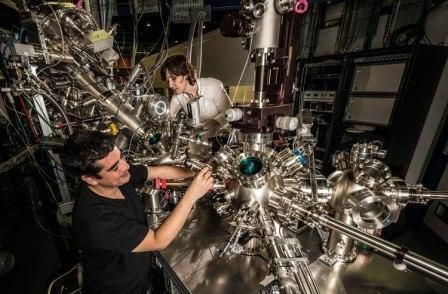
05/11/2014
New catalysts investigated with the ALBA Synchrotron
New catalysts investigated with the ALBA Synchrotron
A group of researchers, led by UPC university in Barcelona, which works on catalysts, has discovered that atoms react differently depending on the characteristics of the support that is used. Part of this study, which has been published on October 31 in the famous Science Magazine, was performed at the CIRCE beamline of ALBA Synchrotron.
The study is an important step forward in the design of new catalysts with applications in the field of energy: the catalyst investigated by the researchers contains metal (rhodium and palladium) nanoparticles and is very effective at producing hydrogen, a product that could replace fossil fuels and contribute to the energy transition.
News based on the press release issued by ALBA Synchrotron.
Image: ALBA Synchroton - Researchers Virginia Pérez-Dieste and Carlos Escudero at NAPP endstation of CIRCE beamline of ALBA Synchrotron
The study is an important step forward in the design of new catalysts with applications in the field of energy: the catalyst investigated by the researchers contains metal (rhodium and palladium) nanoparticles and is very effective at producing hydrogen, a product that could replace fossil fuels and contribute to the energy transition.
News based on the press release issued by ALBA Synchrotron.
Image: ALBA Synchroton - Researchers Virginia Pérez-Dieste and Carlos Escudero at NAPP endstation of CIRCE beamline of ALBA Synchrotron
More news
23/05/2018
Barcelona Is an Attractive City
11/05/2018
UAB University: Top Spanish University According To CYD Global Ranking
03/05/2018
SENER: above and below ground
26/04/2018
Barcelona Synchrotron Park Supports PRUAB
19/04/2018
Hub b30: the emergency number of innovation!
12/04/2018
ALBA synchrotron can serve automobile sector’s needs









